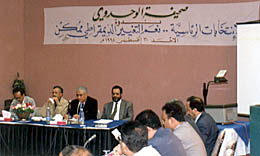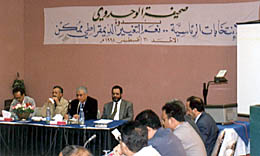
Presidential Elections: Yes, Democratic Change is Possible [Archives:1998/36/Reportage]
September 7 1998

“Republican Imam” According to the Constitutional Power and the Nature of the Yemeni Political System

Then, the paper talked about the way in which the president is elected. Paragraph A of Article No. 105 of the Yemeni Constitution states that the president of the republic is the president of the government. Paragraph B states that the president nominates the vice president himself. So the difference is that the president is given legitimacy through elections, but the vice president is appointed or dismissed like any other official in the government.
Article No. 106 defines the characteristics that must be available in a presidential candidate. They are similar to those mentioned in the previous constitution. The difference is only in the minimum age of the candidate. In the past it was 35 but now it is 40.
If the results of the April 1997 parliamentary elections are taken into consideration, the paper says, it will be found that the candidate of either the People’s General Congress (PGC) or the Islah party, will not find any difficulty in obtaining 10% of the parliament yes votes, around 30 vote out of 301. This is because the PGC got 187 seats and the Islah got 53. But if any other person stands for president, he would have to get yes votes from the five Nasserite and Baath representatives as well as the 25 independents. This is not enough for even one candidate from the opposition.
But what will happen if we have more than one candidate from the opposition. The PGC and the Islah might agree to have a candidate of their party so there is no chance for a candidate from the opposition to get the yes votes of at least 30 representatives. This restricts the MPs and makes them vote for only the candidates of their parties.
Constitutionally speaking, the political regime in Yemen is trying to separate the three authorities: legislative, executive and judiciary. But in reality it is trying to bring them together. This was only done by the Imam in the absence of a constitution, but it is practiced now with the presence of the constitution. This makes it very difficult to classify our system.
According to the constitution, the president is elected for 5 years with wide powers and privileges. Despite the constitution’s emphasis of the judicial system’s independence, it allows the president to have a certain role in the judiciary authority. Article No. 104 of the constitution states that the chairman of the Supreme Judicial Council is the president himself. He is also to issue the decisions concerning the appointment of judges to the Supreme Court.
The same thing happens also in the Supreme Elections Committee. For the president has the right to choose members of the committee from among the 10 people nominated by the parliament. This is on the level of laws. On the level of practice, the resignation of Dr. Faraj Bin Ghanem is a clear example. Article 118 gives the president the absolute freedom to choose the prime minister, but the prime minister has the right, according to Article No. 130, to choose his ministers in coordination with the president. Another example is what happened during the demonstration of Al-Dal’i. Some MPs asked for a fact-finding mission to investigate the matter. The response was that the president will do that himself. So, what is their job?!
Government & Opposition Choices in Upcoming Presidential Elections
Regime Choices

1- Self-reformation and permitting the establishment of the modern and democratic institutions in the country. The regime has also to accept the elimination of the powers acting behind the scenes.
2- President Saleh should not run for the coming presidential elections. He should not allow anybody else to use the public budget for his campaign.
3- The regime has also to permit the establishment of local authorities with wide powers so that the people themselves will be their own rulers and thus responsible for any mistakes they commit. In this way, the central authority will be absolved of any wrongdoing.
4- The regime may give no opportunity for the participation of others and depend completely on brute force. Thus, it will fall like its counterparts in Indonesia and Congo.
Dr. Al-Mutawakil thinks the first choice to be the best. But it is very difficult and a heavy burden on the regime according to its understanding of the government and the system. Therefore, the first choice is considered to be ideal.
The fourth choice is the worst of all. But it is clear that it is the vital one to the regime. That was very clear when the regime used violence to break down demonstrations a few months back. That really violated all international human rights conventions. The choice of using force is of an already known end. Unfortunately, it is the choice the regime believes in and clings to. This choice also co-exists with the mind of the regime.
The second and third choices cannot be ruled out too since President Saleh has sometimes earnest and courageous attitudes. However, the third choice is the most plausible one for there is no longer anything to give to the people except local rule.
Then, the paper introduces some defects of the opposition in Yemen:
1- The job of the opposition leaders is devoid of any sense of hard work and sacrifice. Therefore, they have never been models for youths stimulating them to look for a better future. On the contrary, they have been a disheartening factor.
2- The opposition has failed to unite and organize themselves, and to really address the people’s problems.
Opposition Choices
The opposition parties are not better than the government. And so they have limited choices:
1- Working hard to enhance the power of the populace so that it can force the government to embark on real reform and changing the ruling people through honest elections.
This entails the availability of a good action program relying on democratic and peaceful struggle. The opposition leaders should sacrifice a lot for a good and tangible change. They should also participate in all kinds of elections.
2- Opposition parties joining together in an armed struggle to topple the regime.
3- The opposition should consider the coming local and presidential election as its real battle and should coordinate and work together to win it. They can benefit from the foreign monitoring so as to ensure free and fair elections.
4- The opposition can make a bargain with the PGC ensuring free and fair local elections and in return they support the candidate of the PGC in the presidential elections.
5- The opposition parties do not participate in the elections, particularly when they are not able to get 10% of the parliament votes needed for anybody to run for the presidential elections.
6- The last choice is that the opposition should look at the presidential elections as a means for mobilizing and educating the people about the government’s attitude. It should also seize the opportunity as a means of communication with all the political and social forces in the country.
Dr. Mutawakil believes the choice of cultivating public support is a strategic one and that it should be the first concern of the opposition. The fourth choice is rather realistic and less dangerous to the country. The worst choices are the second and fifth, since the opposition will probably fail in both cases. The result of fighting is the destruction of both the opposition and the country.
Boycotting the elections is very passive and fruitless and not good for the opposition, since it keeps it away from the people. It also makes it unable to show its program and other alternatives to the public. In boycotting the elections, the opposition will not be successful in showing the illegitimacy of the elections neither inside or abroad. So, the second and fifth choices should be ruled out. The success of the opposition in adopting the other choices primarily depend on the ability of the opposition in coordinating their efforts. The possibility of success will be greater if the opposition is able to convince the Islah party to coordinate and cooperate with them. The opposition parties should also choose an acceptable person as their candidate so as to make the roots of democracy very deep. Even when the opposition cooperates with the PGC, choosing their own candidate is very important, no matter whether they succeed or fail. The most important thing is to take part.
Horizon of the Coming Presidential Elections

Voting for the coming presidential elections should be conducted at the earliest on September 23, 1999. But many things can be said about the coming elections. The parliament presidium is not fair and neutral as the supreme election committee is. Another thing is that the possibility of getting the support of at least 10% of MPs for the opposition presidential candidate is very small. This is very clear if we look at the results of the April 1997 elections in which the PGC gained the lion’s share followed by the Islah party. The minimum 10% support is therefore guaranteed for the candidate of the PGC and Islah. In this way the coming presidential elections is limited to the two big parties.
The paper adds that the results of the 1993 and 1997 elections can give us some information about the votes each party gained. For example, the Islah received in the 1993 elections 18% of the votes but in 1997 it got only 23%. Therefore, it is not possible for the candidate of the Islah to get 51% of the votes. But for the PGC which got 28% in 1993 and 43% in 1997, it is possible to get 51% of the votes. But there is something to be remembered. The failure of the PGC in keeping its promises of 1997, the price hikes it makes every time and the disgusting behavior of some of the PGC leaders – all these make the people very unhappy with the proposed candidate of the PGC. But things may become different if President Saleh doesn’t stand as a PGC candidate. Then people may elect him on his personal merit.
By Yemen Times Staff
——
[archive-e:36-v:1998-y:1998-d:1998-09-07-p:./1998/iss36/report.htm]


